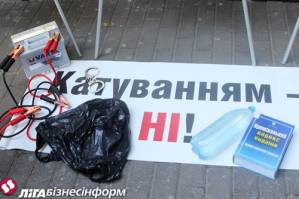• Topics / The right to health care
• Topics / Penal institutions
Healthcare for Remand Prisoners should be under the Health Ministry

A roundtable on 6 October discussed changes needed to the system for medical care in SIZO [pre-trial detention centres] in Ukraine, including passing responsibility for medical treatment to the jurisdiction of the Health Ministry, instead of the State Penitentiary Service.. The roundtable and a street action were organized by the Strategic Litigations Centre and Kharkiv Human Rights Group. The problems were highlighted, with statistical data and expert studies considered, and possible measures needed discussed, including changes to legislation.
Disturbing figures]
The number of prisoners in Ukraine is constantly rising. According to the State Penitentiary Service in the first half of 2011 it rose by 2.49% or by 3, 839 prisoners.
There are 345 people in prison per 100 thousand head of population (against 314 in 2009). This is an increase of 10% and is almost four times the figure for West European countries.
There were 601 deaths during the first 6 months of 2011, while in 2010 there were 808 for the entire year.
The number of HIV-positive prisoners rose by 418, the figure now reaching 6, 438.
Ukraine’s penal institutions are poorly equipped to deal with HIV, tuberculosis and other highly contagious diseases. The functions of the penal system in this area are therefore taken on by institutions subordinate to the Health Ministry and by charities. The inadequate system and measures mean that the number of prisoners with tuberculosis or who are HIV positive is constantly increasing.
There are also major problems with financing. The anti-tuberculosis programme, for example, received only 5.7% of the funding needed.
Medical facilities inadequate
Prisoners, including SIZO or remand prisoners who have not been convicted of any crime, are therefore seriously discriminated against with respect to medical care.
The medical units in SIZO, as well as in penal institutions, are a part of the system of execution of punishments, the doctors hold military rank and obey the administration’s orders. Problems therefore arise with obtaining an unbiased and well-founded diagnosis for a remand prisoner who is ill, as well as with insisting on their immediate hospitalization and obtaining urgent medical assistance where needed.
There are problems quite specific to SIZO.
For example, whereas convicted prisoners have the possibility of being released on the grounds of health, in accordance with Article 84 of the Criminal Code, or can be transferred to specialized hospitals under the jurisdiction of the State Penitentiary Service, this is not available to people remanded in custody. In order for a person held in SIZO to be moved for treatment to a specialized hospital, the court must change the restraint measure, acquit or convict him or her.
Yet people in Ukraine can be held in SIZO for years.
Anatoly Temchenko
Kryvy Rih Rector, Anatoly Temchenko was sentenced earlier this year to 5 years imprisonment for bribe-taking.
Mr Temchenko is 68 years old and had been held in a SIZO for over 19 months. He has a number of serious illnesses, requiring treatment. Despite calls from the Kharkiv Human Rights Group and other organizations, and finally a recommendation from the European Court of Human Rights on 17 March that he receive proper hospital care, the care continued to be highly inadequate.
Denis Zaitsev
Denis Zaitsev, 26 years old, was suspected of committing theft. He died in the Kyiv SIZO on 6 September. The only proven theft was of a jacket costing 240 UAH [less than 25 EUR], yet Denis had been held in the SIZO for more than 5 months, rather than simply being made to, for example, sign an undertaking not to abscond.
An infectious disease attacking the nervous system began progressing in the SIZO, and he gradually lost the ability to walk or speak. He needed special examinations, yet waited for a car from the SIZO for a week because they weren’t allowed to take him by ambulance.
Neither the investigator nor the SIZO medical personnel took measures in time to get him transferred to a specialized hospital. He was moved only when it was too late to help him. He weighed 35 kilograms and was paralyzed. Despite this, he was handcuffed to the bed and could not be moved to emergency care. Part of the equipment needed was brought to his ward, however full emergency treatment was not provided. On the other hand, there were three guards.
The following information about Serhiy Tymoshenko was received a few hours before the roundtable. Serhiy Tymoshenko was apparently beaten by during the deployment of a special anti-terrorist unit at penal colony No. 89 on 5 July. 19 prisoners received injuries at that time. A little later Tymoshenko’s temperature rose suddenly and he developed a sharp pain. Initial complaints were ignored, but he was finally diagnosed as having osteomyelitis, due to a face bone injury becoming infected. He is being held at the Luhansk SIZO waiting for transfer to the appropriate hospital, and simply fed painkillers and anti-inflammatory tablets. As a result, he now has stomach and liver problems.
Change is needed
Human rights organizations believe a comprehensive approach is needed to ensuring that prisoners receive proper medical care.
Medical staff should be taken from under the jurisdiction of the State Penitentiary Service;
Changes are needed to the Penal Code and the Law on Pre-Trial Detention;
Regulations need to be drawn up for hospitalizing people in SIZO;
It is vital that there is a change in practice and in the attitude to the problem by those working in the Penitentiary Service.
Abridged from a report on the roundtable at http://helsinki.org.ua/index.php?id=1317886556





